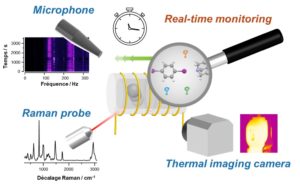CONTEXT
With the current environmental crisis, chemistry must adopt new practices and develop synthetic routes that are more respectful of the environment. In this context, mechanochemistry is particularly attractive as it allows the use of solvents, which are the main source of waste in conventional chemistry, to be significantly reduced, or even eliminated in some cases. Although the interest for mechanosynthesis is continuously growing in the fields of molecular and materials chemistry, the actual reaction mechanisms occurring in the solid state are still poorly understood, thus hampering the further development and use of this technique for the production of novel compounds.

PROJECT DESCRIPTION
This PhD proposal aims at developing new analytical tools for the real-time monitoring of ball-milling reactions, in order to unravel and rationalize the processes involved in solid phase syntheses. Indeed, as of today, the differences in reactivity and selectivity between syntheses in solution and their solid-state analogues are still largely unidentified,[1] due to the lack of chemical and physical information of the phenomena occurring during ball-milling.
In this thesis project, in addition to Raman spectroscopy and temperature measurements, two other complementary techniques will be gradually developed and adapted for real-time monitoring of mechanochemical reactions (also referred to as “operando” monitoring):
i/ an original analytical technique based on the study of the evolution of acoustics (developed recently in the laboratory),[2]
ii/ a new spectroscopic device, related to NMR, which will be developed and adapted to ball-milling during this thesis.
These techniques will first be applied for following the formation of simple molecular materials (cocrystals, MOFs, etc.), before being more widely used for the rationalization of more complex syntheses such as electrophilic cross-couplings, which have recently been adapted to ball-milling.[3]
ENVIRONMENT
The project will take place at the Institut Charles Gerhardt de Montpellier (ICGM) in the D1 department (Chemistry and Molecular Materials, https://www.icgm.fr/linstitut/les-departements/d1/) and more specifically within the MISOTOP research group (https://www.misotoplab.org/). The lab is localized in the CNRS campus, in the North of Montpellier (France), in a brand-new building (pôle Chimie Balard Recherche).
The selected candidate will be funded by a doctoral school fellowship (ED 459). He/she will benefit from all the equipment available at the ICGM for the solid–state synthesis of molecules and materials (including horizontal and vertical vibratory mills, and a planetary mill) and for their characterizations by various techniques (FTIR, Raman spectroscopy, pXRD, liquid and solid–state NMR). A dedicated operando set–up will also be available for the project.
This PhD project will take place under the supervision of Drs César Leroy et Danielle Laurencin.
Because of the multidisciplinary aspect of this project, the work will be developed in strong collaboration with Drs Pierre Granjon (GIPSA–Lab in Grenoble, acoustic studies), Philippe Gaveau (ICGM, instrumental developments related to NMR), and Thomas–Xavier Métro (ICGM, organic syntheses via mechanochemistry).
PROFILE AND SKILLS REQUIRED
The candidate should have a background in materials science, chemistry, physics or solid–state chemistry. Prior knowledge in analytical chemistry as well as NMR spectroscopy will be a real asset. Rigour and organization skills are expected, considering the amount of data which will be obtained via the various operando methods. Fluency in English (spoken, read and written) is mandatory. Moreover, the candidate will have to demonstrate his/her capacity to work on a multidisciplinary topic, and as a team.
REFERENCES
[1] Kubota K. & Ito H., Trends in Chemistry, 2020, 12, 1066–1081,
[2] Leroy C., Mittelette S., Félix G., Fabregue N., Špačková J., Gaveau P., Métro T–X. and Laurencin D., Chem. Sci., 2022, 21, 6328–6334,
[3] Jones A. C., Nicholson W. I., Leitch J. A., Browne D. L., Org. Lett., 2021, 23, 6337–6341
APPLICATION PROCEDURE ET COMPLEMENTARY INFORMATION
This project is supported by a doctoral school scholarship for 3 years (ED 459 Sciences Chimiques Balard – https://edscb.umontpellier.fr/). Candidates are encouraged to contact as soon as possible the supervisors via e–mail (cesar.leroy@umontpellier.fr and danielle.laurencin@umontpellier.fr). The deadline for submitting applications is May the 19th of 2023. Interested candidates must send a CV, a motivation letter, grades from the Master diploma (or equivalent) as well as the names and contact details of three scientific referees.
Pre–selected candidates will have to defend the PhD subject during a doctoral school oral examination the 12th and 13th of June 2023.
The expected starting date is October 1st 2023.
